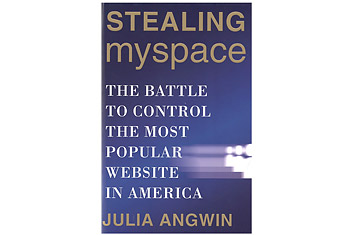
Stealing MySpace: The Battle to Control the Most Popular Website in America
By Julia Angwin
268 pages; Random House
The Gist:
MySpace's story is an almost stereotypical coming-of-age tale for Internet start-ups, a modern-day bildungsroman of social networking. The idea was birthed in the seedy underworld of the Internet by the same folks who brought you such innovations as spam, the pop-up ad and spyware. The site itself was a rip-off, a hastily thrown-together clone of its predecessor Friendster. Both sites missed the heyday of the Web bubble, but there's something to be said for persistence and a good idea, and MySpace quickly grew far beyond anyone's expectations. (See TIME's 50 best websites.)
Angwin's book is a tour through MySpace's turbulent adolescence. The site's massive growth made it an easy target for hackers, privacy advocates, parent groups, competitors and (fortunately for co-founders Tom Anderson and Chris DeWolfe) investors with fat checkbooks. But with its purchase by Rupert Murdoch's News Corporation, MySpace has gone from freewheeling, easy-living Web start-up to establishment player. And as it reluctantly approaches maturity, MySpace has new challenges to face, securing advertisers and innovating new features chief among them. Oh yeah — and a pesky little start-up called Facebook.
Highlight Reel:
1. On MySpace's thrown-together launch: Finally, on August 15, [2003,] they were ready to launch their bare-bones site. Like Friendster, MySpace allotted each user a profile page with pictures and interests and links to friends. It also had a mishmash of features, including horoscopes, games and blogging, then called journals. "We didn't know what it was going to be about," said MySpace staffer Jason Feffer.
2. On pitching the sale of MySpace to Murdoch: On its own, [parent company] Intermix was not much of a prize. It owned a bunch of websites offering games like bingo and animated fart jokes that users could e-mail to one another. It was barely profitable. It had been sued by New York attorney general Eliot Spitzer for distributing spyware inside screen savers, screen cursors and games.
But Intermix also owned a majority stake in a fast-growing website — Myspace.com — which had attracted an impressive 17.7 million visitors the prior month. A consummate salesman, [Intermix CEO Richard] Rosenblatt focused his comments on the potential of adding MySpace's broad audience to complement Rupert Murdoch's already enviable empire of top-flight media companies.
3. On how MySpace and Facebook differ: The rival Web sites had come to embody the two competing visions of digital identity online. MySpace represented the freewheeling spirit of the Web, where anonymity allows people to experiment with their identity and express their views freely. In contrast, Facebook represented a more structured view of online identity, where people authenticate their offline identity in the hopes of creating a community of trust.
The Lowdown:
Angwin, a technology writer at the Wall Street Journal, is equally adept at breaking down both the technological and the business sides of MySpace's development. It's a richly detailed portrait of the growth of a modern media company, complete with all the growing pains, feuds and business machinations that accompany it. Like a MySpace user, though, sometimes Angwin has a tendency to overshare — at one point, the pornography habits of MySpace co-founder Tom Anderson are discussed.
The one area where the detail could stand to be bolstered is in MySpace's plans going forward. Though Angwin makes the case that MySpace and Facebook are fundamentally different sites, the latter is currently in the ascendant — so much so that a book devoted to MySpace's origins seems almost dated. Angwin doesn't leave the reader with a clear picture of how the site will continue to grow, but this may be out of the author's control. Perhaps MySpace isn't quite sure about that either.
The Verdict: Skim.
